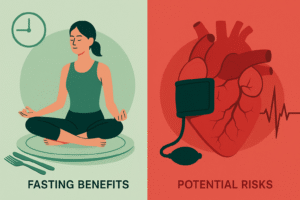Fun fact: In some clinical trials, people who take sugar pills report feeling better—even when they know it’s a sugar pill.
It sounds absurd, right? A pill with no active ingredient, no drug, no chemical magic—and yet, somehow, people feel relief. Pain goes down. Mood lifts. Sleep improves. Welcome to the strange, incredible world of the placebo effect.
The placebo effect is one of the most intriguing mysteries in medicine. It blurs the line between body and mind, science and belief, biology and psychology. And the more we learn about it, the more it seems that belief—yes, just believing—can trigger actual healing.
Let’s unpack how this works, why it challenges everything we think we know about health, and what it means for your everyday life.
What is the Placebo Effect, exactly?
A placebo is an inactive substance or treatment—such as a sugar pill, saline injection, or even a simulated surgery—used in clinical trials to serve as a comparison against the actual medication or intervention. The placebo effect occurs when a patient experiences real improvements in symptoms after receiving a placebo, simply because they believe they’re getting an effective treatment.
That belief triggers real biological responses: reduced pain, lowered blood pressure, improved mood, and even changes in brain activity.
The word “placebo” comes from Latin, meaning “I shall please.” And please, it does—sometimes as much as actual medicine.
Case Study: Placebo vs. Pain
One of the most famous examples comes from a 2008 study at Harvard Medical School. Two groups of patients with chronic pain were treated—one with real painkillers, the other with placebo pills. Both groups reported similar levels of pain relief.
But here’s the kicker: some of the placebo group knew they were taking sugar pills—and still got better.
That’s not just mind over matter. That’s mind-altering matter.

Your Brain, the Pharmacist
So, how does belief work like medicine?
When you expect a treatment to work, your brain releases chemicals like endorphins (natural painkillers), dopamine (linked to pleasure and reward), and oxytocin (the “feel-good” hormone). It also activates regions involved in attention, emotion, and pain regulation.
Think of your brain as a pharmacy. When it believes a treatment will help, it mixes a custom batch of healing chemicals and delivers them exactly where needed. This is why the placebo effect often mimics the expected outcome of the actual drug.
It’s Not Just Pills: Placebos Are Everywhere
The placebo effect doesn’t stop at tablets. It can happen with:
- Injections: Saline injections can trigger pain relief.
- Sham surgeries: In some trials, patients with knee pain who received fake surgery (just an incision, no real procedure) reported the same improvements as those with real surgery.
- Branding: People report more relief from a name-brand tablet than an identical generic one.
- Doctor’s tone: A warm, confident doctor can enhance placebo response, while a cold or sceptical one can reduce it.
It’s not the treatment—it’s the expectation.
Can the Placebo Effect Cure Diseases?
Let’s be clear: the placebo effect won’t shrink tumours or cure cancer. It can’t replace antibiotics for an infection or insulin for diabetes. But it can improve quality of life, relieve symptoms, and even help manage chronic conditions like:
- Irritable Bowel Syndrome (IBS)
- Depression
- Anxiety
- Chronic pain
- Sleep disorders
- Parkinson’s disease
In fact, Parkinson’s patients given a placebo have shown increased dopamine levels and improved motor function—measurable changes in the brain.
The Nocebo Effect: When Belief Makes Things Worse
There’s a darker side to this story, too. The nocebo effect is when negative expectations cause harm. If you believe a harmless substance will make you sick, it might.
For example, patients told they might feel nausea after chemotherapy often do—whether or not the drug causes it. Some even report side effects from placebos when warned about them in advance.
It’s a reminder that the mind can heal—but it can also harm.
India’s Ancient Wisdom: The Mind-Body Connection Isn’t New
The placebo effect may be a scientific term, but its principles echo deeply through Indian philosophy and Ayurvedic practice. From chanting mantras to taking herbal decoctions, much of traditional healing involves ritual, intention, and belief—key ingredients of the placebo response.
Even modern yoga and meditation practices emphasise the power of mindset in managing pain, stress, and illness. Science is just catching up to what tradition has long understood: belief shapes biology.
Ethical Dilemma: Is It Okay to Prescribe Placebos?
Doctors face a tricky question: If a placebo works, is it ethical to use it?
In some countries, doctors are exploring open-label placebos—where patients know they’re taking a placebo, but still benefit. Surprisingly, this works better than you’d expect. A 2010 Harvard study showed that IBS patients taking open-label placebos reported significant improvement compared to those who got nothing.
It suggests that honesty, paired with positive expectation, can still produce powerful effects.
The Future: Can We Harness the Placebo Effect Deliberately?
Researchers are now asking: Can we amplify the placebo effect to complement real treatments?
Some scientists are studying how to “condition” patients, much like Pavlov’s dogs, to respond positively to a treatment ritual. Others are exploring how technology—like virtual reality or AI therapists—can trigger placebo responses through immersive belief.
If we can decode the placebo effect, we may one day design medicine not just for the body, but for belief.
Conclusion: Medicine, Meet Meaning
The placebo effect forces us to rethink how healing happens. It’s not just about molecules and diagnoses. It’s about relationships, expectations, symbols, stories—and trust.
At a time when medicine is increasingly high-tech, the placebo effect reminds us of something timeless: the human body listens to the mind. And belief, when nurtured with care, can be a form of medicine in itself.
So the next time you pop a pill, visit a doctor, or even try a new wellness ritual, ask yourself—not just “What am I taking?” but also “What do I believe will happen?”
Because sometimes, what you believe might be the most powerful ingredient of all.
Author’s Note
The placebo effect isn’t just a trick of the mind. It’s a demonstration of how deeply our beliefs and biology are entangled. As we unlock its mechanisms, we’re learning that healing isn’t just about what you swallow—but what you trust.
G.C., Ecosociosphere contributor.
References and Further Reading
- Harvard Health Publishing: The Power of the Placebo Effect
- NIH: Placebo Effect in Clinical Practice
- The Placebo Effect: New Research Highlights Its Power in Medi…. https://sportnet247.co.uk/2024/10/04/the-placebo-effect-new-research-highlights-its-power-in-medical-treatments/
- The Marijuana-Placebo Study: Another Way to Look at It. https://www.healthylinee.com/the-marijuana-placebo-study-another-way-to-look-at-it.html




